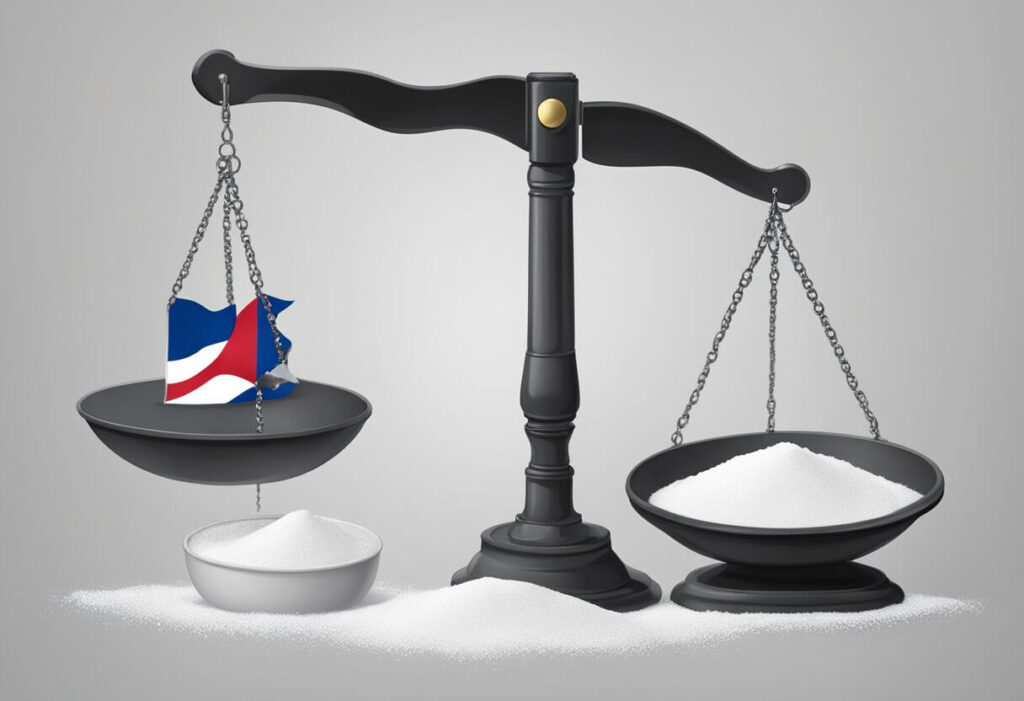Is Cocaine Legal in California? Exploring the State’s Drug Laws

The use and possession of cocaine, a powerful stimulant drug derived from coca plant leaves, is illegal in California with few exceptions. This blog post aims to provide a thorough understanding of California’s laws surrounding cocaine, exploring various aspects such as possession charges, penalties, diversion programs, legal defenses, and future prospects regarding its regulation.
The Legal Status of Cocaine in California
Cocaine, in all its forms (powder, crack, coca leaves, etc.), is classified as a Schedule II controlled substance under the California Uniform Controlled Substances Act. This means its possession, sale, transportation, and manufacture are strictly prohibited, except for limited medical or research purposes under stringent regulations.
The primary laws governing cocaine offenses in California are outlined in the state’s Health and Safety Code, sections 11350-11352. These statutes make it a criminal offense to possess, possess for sale, or sell/transport cocaine, with varying degrees of penalties depending on the specific circumstances.
Penalties for Cocaine Possession in California
Simple Possession Charges and Penalties
Under Health and Safety Code 11350 HS, simple possession of cocaine (for personal use) is typically charged as a misdemeanor offense. The potential penalties include up to one year in county jail and/or a fine of up to $1,000. However, thanks to Proposition 47 (passed in 2014), individuals may be eligible for diversion programs that can lead to the dismissal of charges upon successful completion.
It’s important to note that if the individual has prior convictions for serious or violent felonies, or is a registered sex offender, simple possession may be charged as a felony. Felony cocaine possession carries harsher penalties, including 16 months, 2 years, or 3 years in state prison, and fines up to $10,000.
Possession for Sale/Distribution Charges and Penalties
Possession of cocaine with the intent to sell or distribute is a more severe offense under Health and Safety Code 11351 HS. The prosecution will present evidence such as large quantities, packaging materials, scales, cash, and other indicators of drug sales to establish intent.
For cocaine salt (powder), possession for sale is a felony punishable by 2, 3, or 4 years in state prison and up to $20,000 in fines. For cocaine base (crack), the penalties increase to 3, 4, or 5 years in prison and up to $20,000 in fines.
If the amount of cocaine or cocaine base exceeds one kilogram, additional penalties of 3 to 25 years in prison and fines up to $8 million may be imposed.
Factors Impacting Sentencing
Several factors can influence the severity of penalties for cocaine offenses in California, including:
- The amount of cocaine involved
- Prior criminal history, especially drug-related offenses
- Whether the offense occurred in a drug-free zone (e.g., near a school)
- Whether minors were involved or targeted
- Whether weapons were involved
Judges have discretion in sentencing within the prescribed ranges, considering aggravating or mitigating circumstances.
Diversion Programs and Alternatives to Incarceration
Recognizing the need for a more rehabilitative approach, California offers various diversion programs for eligible individuals facing cocaine possession charges. These programs aim to provide treatment and education instead of incarceration, with the potential for charges to be dismissed upon successful completion.
Deferred Entry of Judgment (PC 1000)
For first-time, non-violent offenders charged with simple possession, the Penal Code 1000 program allows them to enter a drug education and treatment program for 18-36 months. Upon successful completion, the charges are dismissed, and the individual avoids a criminal record.
Proposition 36 (Substance Abuse and Crime Prevention Act)
Proposition 36, passed in 2000, offers probation and community-based treatment instead of incarceration for non-violent offenders, including those charged with possession for personal use. Participants must complete a licensed or certified drug treatment program as part of their probation terms.
Drug Courts
Many counties in California have established specialized drug courts that provide comprehensive supervision, treatment, and support services to individuals charged with drug-related offenses, including cocaine possession. Successful completion of the drug court program can result in reduced or dismissed charges.
It’s essential to consult with a qualified defense attorney to explore eligibility and navigate the diversion program options available in your specific case.
Federal Cocaine Laws

While most cocaine cases are prosecuted at the state level, the federal government also has laws regulating the possession, distribution, and trafficking of cocaine. The Controlled Substances Act (CSA) classifies cocaine as a Schedule II substance, indicating a high potential for abuse and limited medical use.
Federal prosecution for cocaine offenses typically occurs in cases involving large-scale distribution, trafficking across state lines, or when the offense takes place on federal property or involves federal agents.
Penalties for Federal Cocaine Charges
The penalties for federal cocaine offenses can be severe, with mandatory minimum sentences and enhanced penalties based on the quantity of cocaine involved and prior convictions.
- Simple possession of any amount of cocaine can result in up to one year in federal prison and a fine of $1,000 for a first offense.
- Possession with intent to distribute carries penalties ranging from 5 to 40 years in federal prison, depending on the amount of cocaine and the individual’s criminal history.
- Trafficking large quantities (e.g., over 5 kilograms of cocaine or 280 grams of crack cocaine) can result in sentences of 10 years to life in federal prison, with higher penalties for those with prior convictions or cases involving serious injury or death.
It’s crucial to understand that federal cocaine laws are separate from state laws, and individuals may face charges at both levels for the same offense.
Medical and Research Exceptions
While the recreational use of cocaine is strictly prohibited, there are limited exceptions for medical and research purposes under stringent regulations.
Legal Medical Uses of Cocaine
Cocaine has been used in certain medical procedures as a topical anesthetic, particularly in eye, ear, nose, and throat surgeries. However, its use is tightly controlled and restricted due to its high potential for abuse and the availability of safer alternatives.
Research and Clinical Trials
Researchers and medical professionals may obtain licenses and permits to conduct studies involving cocaine, provided they follow strict protocols and adhere to federal and state regulations. These research efforts aim to better understand the effects of cocaine, develop treatments for addiction, or explore potential medical applications.
It’s important to note that these exceptions are narrowly defined and do not extend to personal use or possession of cocaine outside of approved medical or research settings.
The Debate Around Cocaine Legalization
Despite its current illegal status, there is an ongoing debate around the potential legalization or decriminalization of cocaine in California and other parts of the United States.
Arguments for Legalization
Proponents of legalization argue that the criminalization of cocaine has fueled a dangerous black market, contributed to overcrowded prisons, and disproportionately impacted certain communities. They suggest that regulating and taxing cocaine could reduce crime, generate revenue, and allow for safer quality control and education campaigns.
Arguments Against Legalization
Opponents of legalization cite the highly addictive nature of cocaine, potential negative health impacts, and the risk of increased usage and associated societal costs. They argue that legalization could send the wrong message and potentially lead to more abuse and addiction, ultimately outweighing any perceived benefits.
Impacts of Legalization in Other Regions
While no U.S. state has fully legalized cocaine, some countries and jurisdictions have explored decriminalization or harm reduction approaches. Portugal, for example, decriminalized the possession of small amounts of drugs, including cocaine, for personal use in 2001, focusing on treatment and education instead of incarceration. However, the impacts of such policies are complex and continue to be studied and debated.
Defending Against Cocaine Charges in California
If you find yourself facing cocaine charges in California, it’s crucial to seek the assistance of an experienced criminal defense attorney. A skilled lawyer can explore various legal defenses and strategies to protect your rights and minimize the potential consequences.
Common Legal Defenses
Some common defenses against cocaine charges in California include:
- Illegal search and seizure: If the police obtained evidence through an unconstitutional search or without a valid warrant, your attorney may file a motion to suppress the evidence.
- Lack of knowledge or intent: If you were unaware of the presence of cocaine or did not intend to possess or distribute it, this could be a viable defense.
- Entrapment: If law enforcement officers induced or persuaded you to commit a crime you would not have otherwise committed, this may constitute entrapment, which is a legal defense.
- Mistaken identity or false allegations: In some cases, individuals may be wrongfully accused due to mistaken identity or false allegations, which your attorney can challenge with evidence.
Importance of Good Legal Representation
Given the severe penalties associated with cocaine offenses in California, it’s crucial to have an experienced criminal defense attorney by your side. A skilled lawyer can thoroughly investigate your case, analyze the evidence, and develop a strong defense strategy tailored to your specific circumstances.
Additionally, a good attorney can negotiate with prosecutors for reduced charges or favorable plea bargains when appropriate, or vigorously defend your case at trial if necessary.
The Future of Cocaine Laws in California
As public attitudes and policy approaches continue to evolve, there have been discussions and initiatives aimed at reforming cocaine laws in California.
Proposed Reforms and Ballot Initiatives
While no major statewide initiatives have passed to date, some organizations and advocacy groups have pushed for decriminalization or legalization of cocaine and other drugs. These efforts often cite the need for a public health-focused approach, harm reduction strategies, and addressing the disproportionate impact of drug laws on certain communities.
Additionally, there have been calls to increase access to diversion programs, expand treatment options, and reduce penalties for simple possession offenses.
Potential Changes and Outlook
While significant changes to cocaine laws in California may not be imminent, the state has shown a willingness to explore more progressive approaches to drug policy, particularly with the legalization of recreational cannabis in 2016.
As the national conversation around drug policy reform continues, it’s possible that California could consider further decriminalization or legalization measures for cocaine and other substances in the future. However, any such changes would likely face significant political and social challenges, and would require careful consideration of public health, safety, and societal impacts.
Final Thoughts
In California, cocaine remains illegal for most purposes, with strict laws prohibiting its possession, sale, and distribution. Penalties for cocaine offenses can be severe, ranging from misdemeanor charges and fines to lengthy prison sentences, depending on the specific circumstances and quantities involved.
However, the state also offers various diversion programs and alternatives to incarceration for eligible individuals, recognizing the need for a more rehabilitative approach to addressing substance abuse issues.
While there is an ongoing debate around the potential legalization or decriminalization of cocaine, significant legal and societal hurdles remain. Nonetheless, California’s drug policies continue to evolve, with a focus on harm reduction, public health, and addressing the disproportionate impacts of drug laws on certain communities.
Navigating the complex legal landscape surrounding cocaine offenses in California requires the guidance of experienced legal counsel. If you or a loved one is facing cocaine-related charges, it’s crucial to seek the assistance of a skilled criminal defense attorney who can protect your rights and explore all available options for a favorable outcome.






